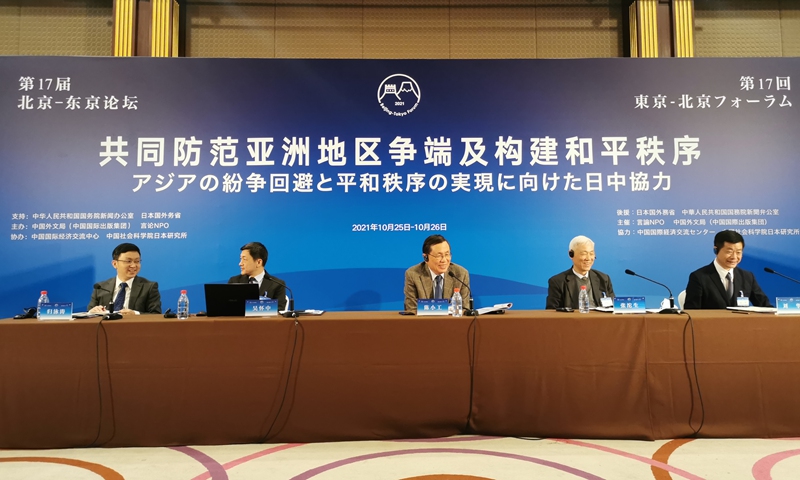
Sub-forum on regional security at the 17th Annual Beijing-Tokyo Forum Photo: Xu Keyue/GT
Experts from China and Japan urged for the early resumption of high-level defense exchanges on Tuesday at the 17th Annual Beijing-Tokyo Forum to help ensure strategic regional stability.
They also held discussions on recent hot issues, including the Taiwan question, hypersonic technology, maritime security and cyberspace security.
Some of the experts stressed the importance of early resumption of the dialogue on strategic stability between the two governments in the post-pandemic era, including vice-ministerial-level defense consultations and visits by defense ministers.
Osamu Onoda, former commanding officer of the Japan Air Self-Defense Force Air Training Command, said at the forum that the exchanges between China and Japan, including those on the Taiwan question, did not go smoothly. Also, the recent frequent actions of the Chinese navy and air force show that the strength of the Chinese military has greatly improved and Japan, as well as the US, are concerned about the tension in the Taiwan Straits, Onoda said.
Onoda asked Chinese experts the reason why the Chinese mainland government seems reluctant to deal with Tsai Ing-wen's authority on the island of Taiwan while cross-Straits relations made progress under the island's former leader, Ma Ying-jeou.
Responding to Onoda's question, Yao Yunzhu, retired major general of the Chinese People's Liberation Army and senior advisor of the China Association of Military Science, said that the main reason why the mainland has not responded positively to the Tsai Ing-wen administration is that it does not accept the 1992 Consensus.
By not recognizing the 1992 Consensus, the Tsai Ing-wen administration has taken away the political foundation for cross-Straits dialogue. And to communicate with a leader in Taiwan who does not recognize the one-China principle is to encourage and support the separatist actions of the Taiwan independence forces, she noted.
When talking about the situation across the Taiwan Straits, a Japanese guest said that if the US made it clear that it would "defend the island of Taiwan," would Japan join the US? Will Japan strengthen defense cooperation with the island of Taiwan? Japan may face a dilemma.
Liu Hua, director of Reference News' think tank, pointed out that Japan's national interests are very different from those of the US, and Japan should maintain its independence in policy making. Assuming that Japan must step up its involvement in the South China Sea and the Taiwan Straits, it should evaluate whether it can support the involvement with its own capabilities and whether the results of the involvement in line with their own security interests. Liu noted that it is also worth pondering whether Japan can win real security and stability by trying to woo outside forces to intervene in the regional affairs.
Yoji Koda, former commander-in-chief of the Japan Self Defense Fleet, refuted Chinese suspicions over Japan's independence, saying that some Chinese claimed that Japan is an "attendant" of the US, which is not the case, and stressed that Japan is an independent country.
Katsutoshi Kawano, former chief of staff of the Japan Maritime Self-Defense Force, asked at the forum why the Chinese government has not strongly opposed Singapore's military training in the island of Taiwan.
There are two main reasons for this, Yao explained. First, without army bases in its country, Singapore has long rented military bases in Taiwan for its own army training. Such training is unilateral and not conducted jointly with the troops of the Taiwan island. Second, this initiative has a long history since the founding of Singapore. There is tacit understanding between the Chinese mainland and Singapore on this issue, according to Yao.
In addition, as the West has repeatedly expressed concerns about China's development of hypersonic missile technology, Ken Jimbo, professor at the Faculty of Policy Management of Keio University, raised the issue again asking about the purpose of China's recent test of hypersonic missile. On this matter, the Chinese Foreign Ministry already clarified the purpose of the West-hyped test as
a routine spacecraft experiment to test the technology of spacecraft reusability.
A Chinese military expert who attended the forum on Tuesday explained in detail that the hypersonic weapon technology that Japan is concerned about is not the latest or the most cutting-edge technology. It has a history of at least 20 years and it emerged during the arms race between the US and the former Soviet Union. The US government originally planned to develop a defense system that could intercept nuclear weapons, but because it was expensive, it instead developed a hypersonic glide vehicle designed to render adversaries defenseless.
The US, Russia and China are known to have such technology and India is also developing it, the military expert told the Global Times on Tuesday. The US, Japan and other countries should be well aware of this situation and deliberately hyping the issue recently makes people feel "dazed," the expert said.
It is worth noting that in the discussion activities on Monday experts from China and Japan disputed over some issues but at Tuesday's forum both sides discussed the contentious issues in a more relaxed atmosphere.
Ichiro Fujisaki, former Japanese ambassador to the US, began the meeting by proposing that the two sides stop dwelling on their known differences and focus on finding new areas of cooperation.
In safeguarding regional peace and stability, the experts from both countries agreed that the two countries should properly handle differences, prevent accidental conflicts and adhere to peaceful settlement of disputes. At the same time, the two sides should further enrich and strengthen crisis management mechanisms, including maritime and air liaison instruments, build constructive security relations and conduct consultations on regional security guarantees.
At the forum, Chinese and Japanese experts expressed the need to maintain exchanges and dialogue in the future, hoping to realize mutual visits after the pandemic ends.




